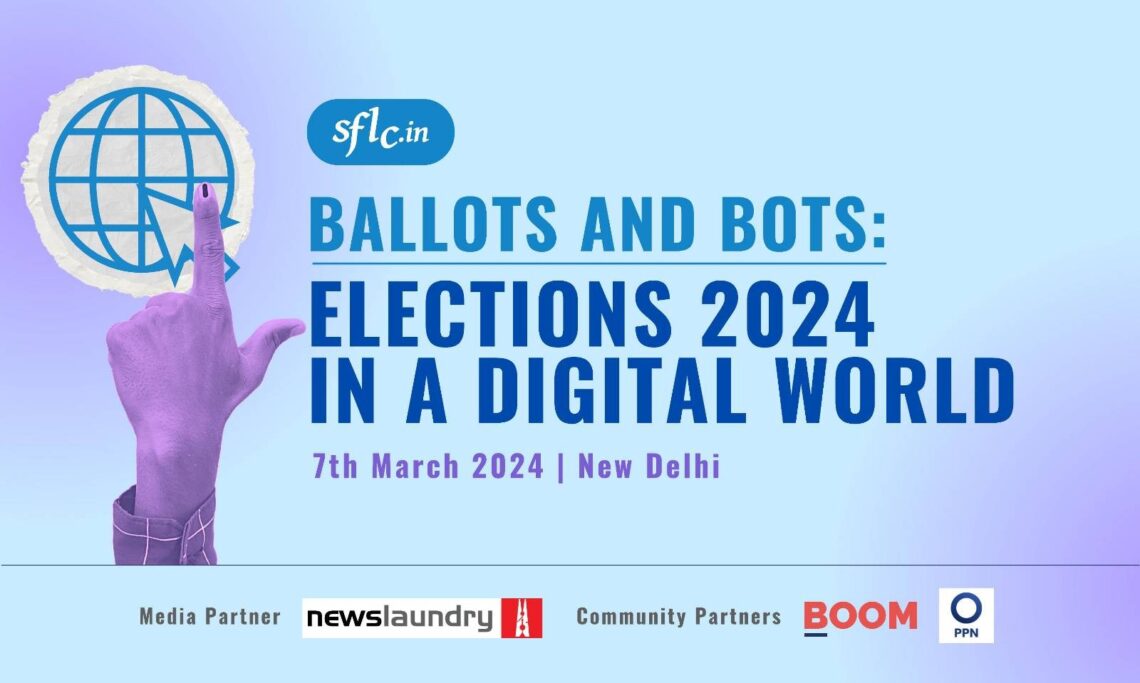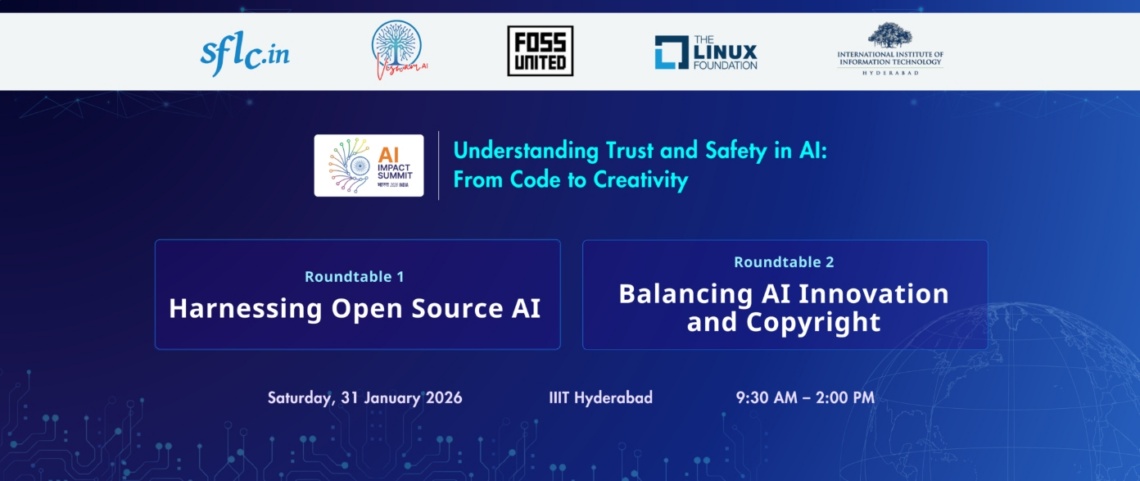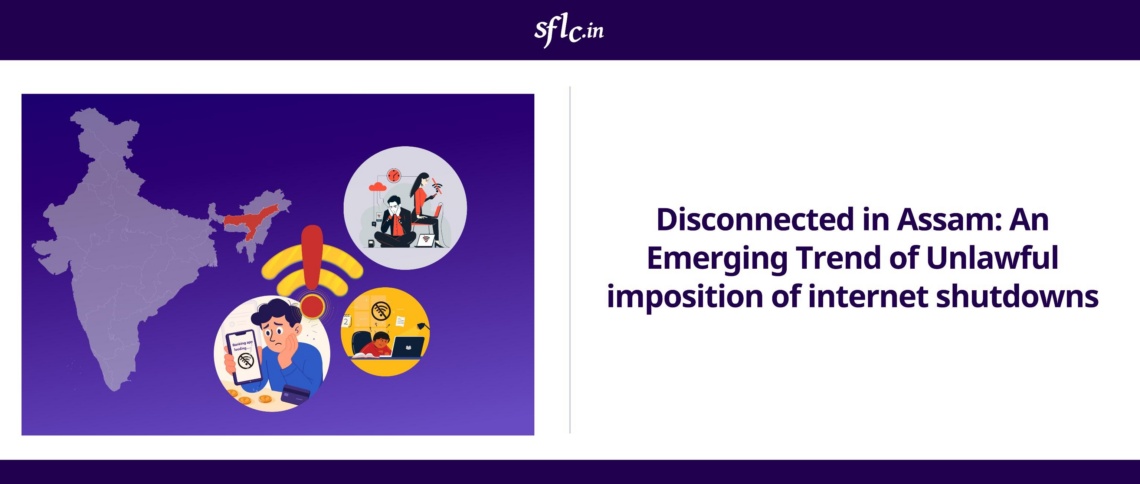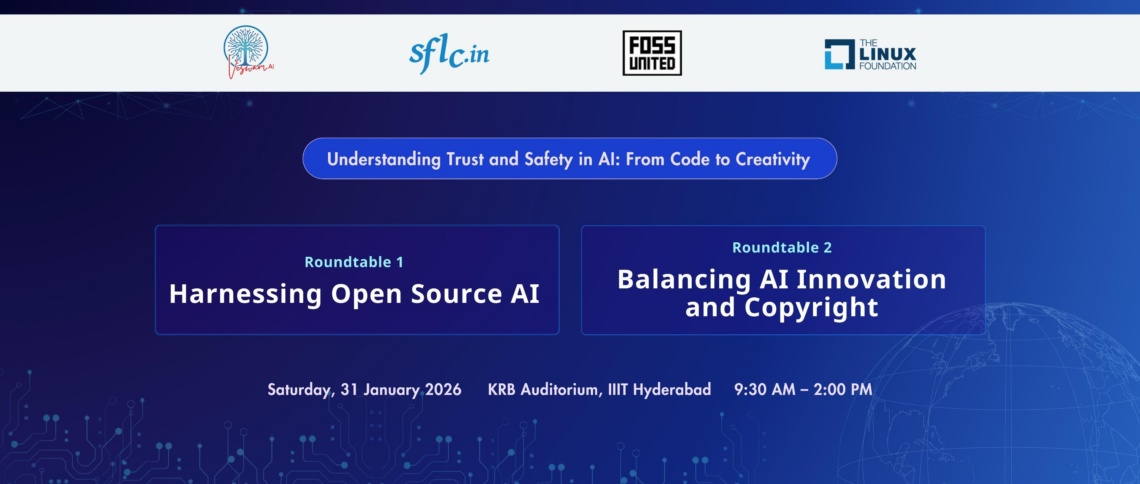On 07 March, 2024 , Team SFLC.in organized a panel event titled “Ballots and Bots: Elections 2024 in a Digital World” at India International Center, New Delhi. The event delved deep into the pivotal role of technology on our electoral processes, particularly as we gear up for the 2024 General Elections. With a strong focus on the interplay between truth, misinformation and the transformative influence of artificial intelligence, the event garnered significant attention among the attendees and fostered enriching panel discussions at the intersection of technology and elections.
Panel 1: Truth or Tale? Misinformation During Elections – This panel discussion highlighted the impact of misinformation on voter decisions and explored strategies to uphold the integrity of our electoral process.
- Karen Rebelo noted that misinformation is a feature not a bug. In India, misinformation is weaponised, and quite often political parties have a role to play. She added that the problem is accentuated as anyone with a laptop today can make fabricated content, without any specialised expertise. Rebelo emphasized the complexity of combatting misinformation, stressing that it will require a collective effort involving various stakeholders beyond just fact-checkers as a solution.
- Pratik Sinha emphasized that misinformation serves as a tool to manipulate the general population at large. Targeting vulnerable individuals and groups, misinformation is polarising people. He cautioned against equating responsibility among political parties, adding that those with significant financial resources bear greater accountability. Pratik urged political parties to address the issue, emphasizing the importance of first acknowledging the problem before implementing effective policies.
- Mmhonlumo Kikon highlighted that misinformation at a certain level does affect the sentiments of people during a political campaign but when it comes to voting, people make their own choices based on their own considerations. He also highlighted that the Election Commission requires candidates to disclose their social media details during nomination, enabling active monitoring and enforcement of election laws on social media platforms.
- Jasmine Shah expressed concerns about the widespread impact of misinformation not only during elections but also during election cycles. He criticized the indemnity with which misinformation is propagated and highlighted its suppression of legitimate reporting by the state machinery. Shah advocated for both short-term measures, such as establishing a regulatory body or enforcing social censure, and long term solutions like introducing a media literacy course in states where the governments hold authority.
- Vineet Kumar spoke about the “Error 404 of Journalism” where reports published years ago are being removed and emphasized on identifying the beneficiaries of misinformation dissemination, particularly politicians or political parties who are benefitting from it. He added that, misinformation has become an opportunity for career enhancement for politicians. He also highlighted the need to diminish the heroic portrayal of those spreading false narratives to effectively address the issue.
Panel 2: Decoding Democracy 2.0: Navigating AI’s Impact on Elections – This panel discussion highlighted AI’s potential to empower the electorate while acknowledging the vulnerabilities to manipulation. Here are some key takeaways from the panel discussion:
- Mayank Vats spoke about the potential impact of Generative Artificial Intelligence on the democratic process, emphasizing the necessity for the development of robust detection techniques. He cautioned against the misuse of deepfake technology, underscoring its potential to manipulate elections and deceive voters. He highlighted that watermarking as a solution to deepfakes cannot be the silver bullet. There would be potential of bad actors to use open-source alternatives. In this regard, he highlighted the importance of civil society organisations and companies to contribute their expertise. He stated that Generative AI can create accessible videos for disabled people. Voter education also/engagement would be the fastest way to improving the state of affairs.
- Charru Malhotra expressed concerns on the impact of manipulated videos on the electoral process. She emphasized the necessity for a holistic approach to elections, calling for increased awareness among consumers, users, and politicians. Citing the example of identifying tampering through CCTV in the case of electoral bonds, Charru cautioned against data vulnerability and stressed the urgency of examining the entire systems of technology at play. She also advocated for targeted outreach to sensitize swing voters.
- Tarunima Prabhakar highlighted that it has become increasingly difficult to identify deepfakes from the naked eye owing to lack of visual cues. She posed questions regarding the use of technology as it by itself could not be considered to be neutral. There is also a tendency of companies to not adhere to their own standards laid down globally. She also highlighted the importance of media literacy and taking a conservative approach to content.
- Divyendra Singh Jadoun discussed the dual nature of deepfakes highlighting both positive and negative effects depending on their application. He cited examples such as personalized language translation facilitating scalable messaging and political parties adopting AI for communication strategies. Divyendra also emphasized on the importance of avoiding volatile or content that has the tendency to manipulate emotions excessively.
- Prasanth Sugathan highlighted that the role of platforms in disseminating content as the recently issued AI Advisory by MeitY was on what platforms can do. Another aspect he highlighted was regarding the North South divide, in that moderation practices adopted by platforms in the North vary from those in the South. He questioned whether platforms were implementing similar measures in the US and India and stressed the need for standardized practices. Prasanth also emphasized the importance of public education and called for active involvement from both the Election Commission of India and intermediaries in addressing these challenges.
Following the insightful discussions, our team developed letters addressed to the Election Commission of India and Platform Companies. These letters advocate for the implementation of stringent measures to counter the spread of manipulated media and the misuse of generative AI technologies as India gears up for the 2024 General Elections.
We believe that every citizen’s voice is crucial in shaping the policies and practices that govern our democratic processes. Therefore, SFLC.in encourages you to join us in advocating for stringent measures by signing these letters and contributing to the collective effort towards positive change.
- Letter to ECI: https://form.sflc.in/joint-letter-to-eci-on-deepfakes-and-manipulated-media/
- Letter to Platform Companies: https://form.sflc.in/joint-letter-to-platform-companies-on-deepfakes-and-manipulated-media/
We continued the discussion and extended the conversation to a Twitter (X) Space on “Fact-Checking and Electoral Values: In Conversation With Experts” on International Fact-Checking Day, April 02, 2024. The discussion underscored the significance of fact-checking in the digital age and provided attendees with practical strategies in finding accurate information amidst the noise of misleading information available online.
Speakers:
1. Ms. Divya Chandra, Producer, Workshop & Training, Boom
2. Ms. Kritika Goel, Head, Editorial Operation, Logically Facts
3. Mr. Jatin Gandhi, Executive Editor, Jagran New MediaModerator: Mr. Prasanth Sugathan, Legal Director, SFLC.in.
Ms. Divya Chandra emphasized upon the vital role of fact-checking in countering false information, particularly during elections. She stressed upon the possible challenges of keeping pace with the rapid dissemination of misinformation, especially in the context of political campaigns. The issue of transparency in AI-generated content, and the absence of disclaimers from political entities utilizing such technologies, which further contributes to the spread of manipulated content without any proper context was also highlighted.
Ms. Kritika Goel delved into the increased usage of Generative AI in producing manipulative content She highlighted the obstacles faced by fact-checkers in identifying AI-generated content. Despite the existence of advanced detection tools, she pointed out their limitations in effectively identifying and debunking deepfakes, highlighting the necessity of relying on 100% accurate evidence in the fact-checking process. Moreover, Kritika underscored the importance of addressing the spread of AI-generated content, particularly its impact on public perception and trust in information sources.
Mr. Jatin Gandhi provided insights into the traditional role of fact-checking within Journalism and its evolution in the Digital Age. He addressed the prevalence of unverified information on social media platforms and its consequences for public discourse and informed decision-making. Jatin highlighted the emergence of synthetic media and deepfakes as significant hurdles for fact-checkers, emphasizing upon the necessity for expertise in digital forensics to identify and debunk manipulated content effectively.
The recording of the discussion can be accessed here:
https://twitter.com/i/spaces/1YqJDgRmWMQGV
Since our establishment in 2010, we have championed digital freedoms and rights, fostering collaborative efforts among diverse stakeholders to advance the cause of digital rights in India and beyond.
Stay tuned for further insights and initiatives from Team SFLC.in as we navigate through the evolving landscape of technology and elections in the digital era.




